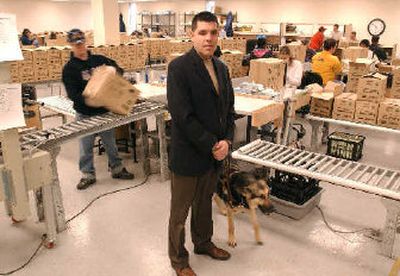Training programs build business skills among the blind

Losing his sight in a car crash 11 years ago didn’t stop Danny Novielli from going to college to study business. With the help of various “adaptive technologies” like a Braille note-taking device and software that reads text that appears on computer screens, he wound up graduating at the top of his class.
But despite achieving a perfect 4.0 grade point average in his major at Middle Tennessee State University, just east of Nashville, Novielli did have trouble getting a job, as most blind people do. Now, five years later, he’s an executive at an agency that employs blind people and helps them find jobs.
Novielli, an affable 35-year-old who gets around with a seeing eye dog named Venice, represents the kind of upward mobility that advocates for the blind are hoping to achieve with new training programs aimed at giving blind people a better chance to advance in business careers.
After a stint in the army as a contract specialist, Novielli, who had worked in construction and for the Coast Guard before losing his sight, became one of the first three people last fall to complete a new, two-year intensive program run by the National Industries for the Blind, an umbrella group of more than 80 agencies that employ blind people to make products for the federal government under special budgetary set-asides.
He was nervous at first, but soon got over it. “I was just going to work,” Novielli said in a phone interview. “It wasn’t, ‘The blind guy going to work.’ “
Today, Novielli is the business development manager at Bosma Industries for the Blind in Indianapolis, one of the agencies in the NIB’s network. They package medical gloves for Veterans Administration hospitals and make linens for state facilities such as prisons and other products.
Studies have consistently shown that only about 30 percent of the nation’s 10 million blind and severely visually impaired people of working age actually have jobs. In addition to the fast-track fellowship that Novielli attended, the Alexandria, Va.-based NIB is taking other steps to advance the careers of the thousands of blind people who work for them.
Under the leadership of Jim Gibbons, a 42-year-old former executive for AT&T Corp. who is blind himself, NIB has set out to correct a longstanding imbalance in the world of employment for the blind. While many blind people have entry-level type jobs in business, relatively few have advanced into the management ranks, even in agencies that exist to employ blind people.
Novielli completed the two-year fellowship program last fall, and the second class of six new fellows began last month. One of them is David Geary, a 34-year-old man with severe visual impairment who had been an assistant district attorney in western Pennsylvania.
The fact that Geary, who was already an accomplished lawyer, joined the NIB’s two-year business boot camp “shows you that the opportunities for blind people are limited,” Gibbons said. “We are hungry for advancement and mobility.”
Gibbons hopes that the fellowship program will develop people who can take increasingly senior roles in the NIB’s network of agencies, and even run some of them. His goal is to expand the program to up to 20 or so people a year, with perhaps half of the graduates staying within the NIB network and others taking jobs in related fields or attending top business schools.
In addition to the fellowship program, Gibbons also helped set up a business management and training course designed for blind students in cooperation with the University of Virginia’s Darden School of Business in 2004.
Sharon Giovinazzo, a 36-year-old woman who lost her sight to multiple sclerosis, leapfrogged from sewing linens to taking on a public policy and consumer relations role at the Central Association for the Blind and Visually Impaired in Utica, New York after completing the 18-month program at Darden.
Now she’s a full-time student in human services management at the State University of New York in Utica, and plans to pursue a masters degree as well.
“I was sewing sheets, towels and pillowcases, so I was hoping to find an upwardly mobile position,” Giovinazzo said in an interview just before heading to Washington to discuss issues regarding the employment of blind people with legislators.
“A lack of sight doesn’t mean a lack of vision,” she said. “You can still set goals and reach for them.”
The Darden program and other efforts to get management training for blind people are starting to yield results. Bosma Industries went from having no blind people in management four years ago to about 25 percent today, Novielli said.
Still, “it’s just the beginning,” says Carl Augusto, president and CEO of the American Foundation for the Blind, a national nonprofit organization founded in 1921 that advocates for and assists blind and visually impaired people.